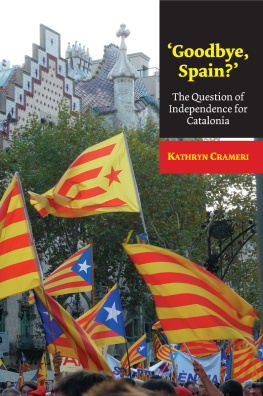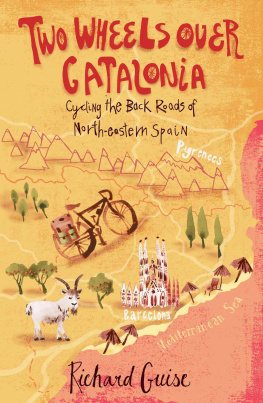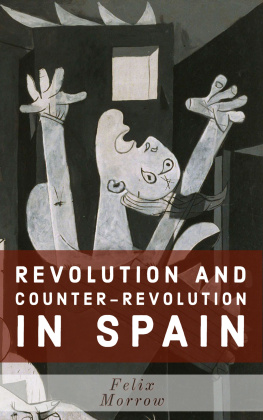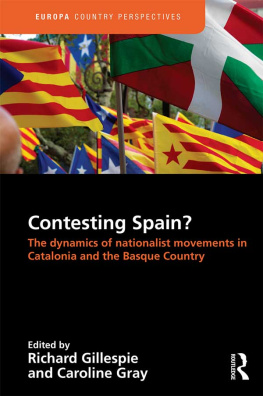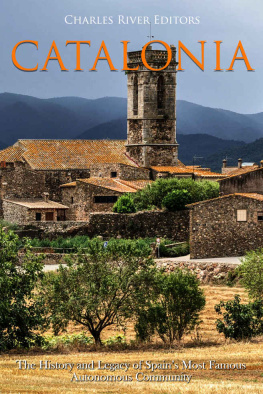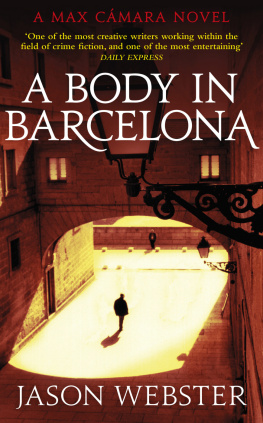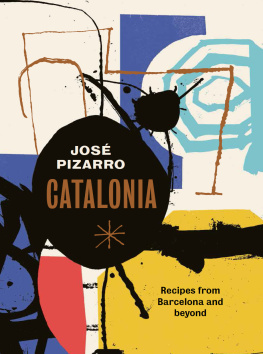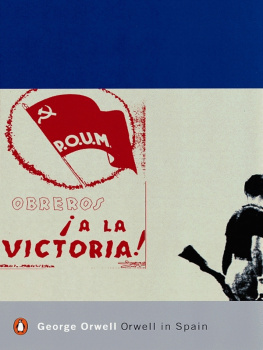Professor Crameris Goodbye, Spain? marks a milestone in scholarship in Catalunyas long and turbulent history. Whether the title of this book proves to be prophetic remains to be seen. Perhaps Catalunya will be granted the right to decide its future in 2014, or perhaps this will be denied, though one hopes not through military intervention. But irrespective of the outcome of the forthcoming consultation, and the subsequent political engagement, the issue of independence is now so ingrained in the contemporary Catalan psyche (and indeed in its equally strongly felt rejection by parts of mainland Spain) that its potential could mark and sour internal Spanish politics for decades to come. From the Preface by Geoff Cowling, HM Consul General, Barcelona 2002/2005
Support for independence in the Autonomous Community of Catalonia has risen significantly since 2005. Opinion polls confirm that the idea of holding a legally-binding referendum on independence is now supported by 80% of Catalans. Many commentators on nationalism in Western Europe had come to the conclusion that there was no serious threat to the established nation-states from secessionism within their borders. In The Identity of Nations (2007), Montserrat Guibernau wrote that decentralisation tames secessionism, both by offering significant power and resources to the national minorities it seeks to accommodate and by enticing regional political elites with the power, prestige and perks associated with devolution. Scott Greer, in Nationalism and Self-Government (2007), wrote that secession seems unlikely in the Catalan case because the regional political elites have too much to lose by such a move and are most concerned with winning further autonomy in specific areas that stabilise their own hold on regional power a conclusion called into question by the recent radicalisation in Catalan politics and civil society.
Causes for these striking changes in public sentiment include changes in the Catalan political landscape since 2003, problems of infrastructure, public apathy with the political process, disillusionment with the Spanish government, a rise in anti-Catalan feeling from other Spaniards (and a rise in anti-Spanish feeling among Catalans), the effects of the global financial crisis, and the bumpy ride experienced by Catalonias new Statute of Autonomy. One notable change has been a shift in the dominant discourse of Catalan nationalism from concerns regarding language, culture and identity toward the political and economic welfare of Catalans. These political and economic discourses have overlaid rather than replaced cultural aspects.
Kathryn Crameri is Head of the School of Modern Languages and Cultures at the University of Glasgow. Her published work covers Catalan culture, identity and nationalism, and includes Catalonia: National Identity and Cultural Policy 19802003 (University of Wales Press, 2008). Goodbye, Spain? brings this experience to bear on the crucial issue of the recent and unexpected rise in support for Catalan independence.
The Caada Blanch / Sussex Academic Studies on Contemporary Spain
General Editor: Professor Paul Preston, London School of Economics
Margaret Joan Anstee, JB An Unlikely Spanish Don: The Life and Times of Professor John Brande Trend.
Richard Barker, Skeletons in the Closet, Skeletons in the Ground: Repression, Victimization and Humiliation in a Small Andalusian Town The Human Consequences of the Spanish Civil War.
Germ Bel, Infrastructure and the Political Economy of Nation Building in Spain, 17202010.
Kathryn Crameri, Goodbye, Spain?: The Question of Independence for Catalonia Michael Eaude, Triumph at Midnight in the Century: A Critical Biography of Arturo Barea.
Francisco Espinosa-Maestre, Shoot the Messenger?: Spanish Democracy and the Crimes of Francoism From the Pact of Silence to the Trial of Baltasar Garzn Soledad Fox, Constancia de la Mora in War and Exile: International Voice for the Spanish Republic.
Mara Jess Gonzlez, Raymond Carr: The Curiosity of the Fox.
Helen Graham, The War and its Shadow: Spains Civil War in Europes Long Twentieth Century.
Angela Jackson, For us it was Heaven: The Passion, Grief and Fortitude of Patience Darton From the Spanish Civil War to Maos China.
Gabriel Jackson, Juan Negrn: Physiologist, Socialist, and Spanish Republican War Leader.
Sid Lowe, Catholicism, War and the Foundation of Francoism: The Juventud de Accin Popular in Spain, 19311939.
David Lethbridge, Norman Bethune in Spain: Commitment, Crisis, and Conspiracy.
Carles Manera, The Great Recession: A Subversive View.
Olivia Muoz-Rojas, Ashes and Granite: Destruction and Reconstruction in the Spanish Civil War and Its Aftermath.
Linda Palfreeman, SALUD!: British Volunteers in the Republican Medical Service during the Spanish Civil War, 19361939.
Linda Palfreeman, Aristocrats, Adventurers and Ambulances: British Medical Units in the Spanish Civil War.
Cristina Palomares, The Quest for Survival after Franco: Moderate Francoism and the Slow Journey to the Polls, 19641977.
David Wingeate Pike, France Divided: The French and the Civil War in Spain.
Hugh Purcell with Phyll Smith, The Last English Revolutionary: Tom Wintringham, 18981949.
Isabelle Rohr, The Spanish Right and the Jews, 18981945: Antisemitism and Opportunism.
Gareth Stockey, Gibraltar: A Dagger in the Spine of Spain?
Ramon Tremosa-i-Balcells, Catalonia An Emerging Economy: The Most Cost-Effective Ports in the Mediterranean Sea.
Maria Thomas, The Faith and the Fury: Popular Anticlerical Violence and Iconoclasm in Spain, 19311936.
Dacia Viejo-Rose, Reconstructing Spain: Cultural Heritage and Memory after Civil War.
Richard Wigg, Churchill and Spain: The Survival of the Franco Regime, 19401945.
Copyright Kathryn Crameri, 2014.
Published in the Sussex Academic e-Library, 2014.
SUSSEX ACADEMIC PRESS
PO Box 139
Eastbourne BN24 9BP, UK
and simultaneously in the United States of America and Canada
Published in collaboration with the Caada Blanch Centre for Contemporary Spanish Studies and the Catalan Observatory, London School of Economics.
All rights reserved. Except for the quotation of short passages for the purposes of criticism and review, no part of this publication may be reproduced, stored in a retrieval system or transmitted in any form or by any means, electronic, mechanical, photocopying, recording or otherwise, without the prior permission of the publisher.
British Library Cataloguing in Publication Data
A CIP catalogue record for this book is available from the British Library.
Library of Congress Cataloging-in-Publication Data
Crameri, Kathryn.
Goodbye, Spain? : the question of independence for Catalonia / Kathryn Crameri.
pages cm
Includes bibliographical references and index.
ISBN 978-1-84519-659-2 (hb : alk. paper)
ISBN 978-1-78284-163-0 (e-pub)
ISBN 978-1-78284-164-7 (e-mobi)
ISBN 978-1-78284-165-4 (e-pdf)
1. Catalonia (Spain)HistoryAutonomy and independence movements.
2. NationalismSpainCataloniaHistory21st century. I. Title.
DP302.C68C73 2014
320.1509467dc23
2014005776
This e-book text has been prepared for electronic viewing. Some features, including tables and figures, might not display as in the print version, due to electronic conversion limitations and/or copyright strictures.

